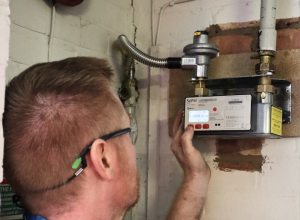Sam Dean, Business Development Manager at IMServ, one of the UK’s largest independent energy data management providers, discusses the impending deregulation of the water industry in England in 2017, and the benefits and risks it brings with it.
Water deregulation is coming to England in 2017, and it will usher in a sea change in how businesses select their water. While large business customers have enjoyed some choice of water supplier in recent years, in April 2017 the whole business market will be opened up in England for the very first time.
What does this mean for businesses? It has the potential to provide them with cost savings along with total transparency of their water consumption, enabling informed energy choices and the ability to enact effective energy management strategies. The environment will benefit from reduced water wastage, while utility companies will have the opportunity to transform themselves into innovative market leaders.
It is not a new phenomenon in the UK. Reports from Scotland, where water deregulation was implemented seven years ago, suggest companies have enjoyed numerous benefits, with some reporting savings of up to 12% on their energy bills. Hospitality, leisure and restaurant services in particular made substantial savings through reduced costs and reduced waste. In addition to this, the deregulation led to 28,000 tonnes of carbon savings, according to Business Stream. While Scotland is a smaller market than England, these figures give an insight into what might be in store in 2017.
The potential positives of the move are clear. Deregulation will open up competition, and enable businesses to pick their water supplier. In turn, the suppliers will invest in better services and new innovations in order to attract customers. Scottish businesses, for example, saw a proliferation of AMR meters, increasing visibility of water consumption and allowing for a more efficient, more sustainable approach to be taken.
IMServ believes the same thing will happen in England – total transparency to internal and external stakeholders is the new market trend. Metering and easy-to-view, dynamic and engaging data visibility will be key to this, allowing businesses and employees to make efficiency measures quickly and decisively. For example, if a set threshold of water consumption is breached, the business can be informed, allowing them to take preventative measures if necessary. Similarly, improved water leak detection will allow any problems to be swiftly identified and dealt with. Such responsiveness and flexibility can be invaluable when it comes to making savings.
The changes will also help incentivise utility providers to be more efficient, improve service and reduce customer consumption, leaving more water for the environment while reducing businesses’ water spend.
Deregulation does not come without its risks, of course, and a few potential stumbling blocks can be identified amongst the tide of positivity. Currently the thirty-two* water companies in England provide a generic, standardised service. However, with increased competition could come differentiation of service and a drive for lower prices at the expense of customer service, although Scotland did not experience this trend.
Moreover, there are concerns over whether water companies are ready to offer a competitively priced service. But with a long lead time, and lessons available from the Scottish experience of deregulation, there is every opportunity for suppliers to prepare themselves to enter the market and maximise the opportunities that competition will provide. Indeed, whether deregulation sinks or swims depends on whether suppliers embrace their new position.
The biggest question, though, is how water will differ from gas and electricity services, where some customers have complained of high prices and complicated bills despite deregulation? There’s no guarantee water will avoid these issues, though Scotland has not yet experienced them. But it will again depend on whether suppliers take measures to avoid the problems other utilities have encountered – for example, by ensuring that the processes to allow quick and hassle-free change of supplier are in place. Nonetheless, deregulation will certainly be a leap of faith to some extent. What worked one way in Scotland may work differently in England, and only time will tell whether that will be to the benefit of English businesses.
Ultimately, though, the aim is to give the customers what they want: a better service at a better price. There may be bumps in the road, but customers should get more control, faster innovation, and greater transparency when it comes to their water consumption. It’s up to water suppliers to enable this, and energy data management companies such as IMServ to support them. If we succeed, water will no longer lag behind the other utilities, but will instead become an efficient and responsive service in a dynamic, competitive market.
–ENDS–
*32 water companies according to OfWat (http://www.ofwat.gov.uk/households/your-water-company/)
Editor’s Notes
About Sam Dean
Sam Dean, Business Development Manager, heads up the partnering sales and strategic collaboration channel within IMServ. Sam’s experience includes twelve years of expertise within the energy sector, working for FTSE 100 organisations such as National Grid, Rolls Royce, Siemens Metering and IMServ within Leadership, Business Development and Head of Sales roles. Educated to degree and MBA standard with an understanding into the current market trends and demands of delivering a customer centric approach to monitoring, control and data intelligence.
About IMServ (www.imserv.com)
IMServ Europe Ltd is one of the UK’s largest independent energy data management providers. The company offers electricity, gas, water and energy management solutions, helping organisations across all sectors to save costs, reduce consumption and control carbon emissions.
IMServ offers an all-inclusive portfolio that covers data collection, analysis, reporting and carbon management. To date over 240,000 sites in England, Scotland and Wales are benefiting from its solutions.



